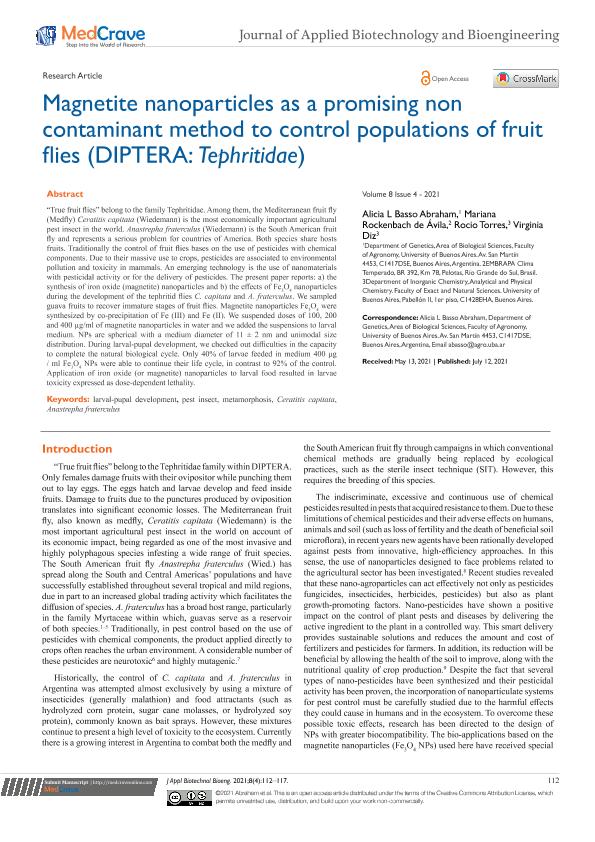Artículo
Magnetite nanoparticles as a promising non contaminant method to control populations of fruit flies (DIPTERA: Tephritidae)
Basso Abraham, Alicia Leonor Rufina; Rockenbach de Ávila, Mariana; Torres, Rocío ; Diz, Virginia Emilse
; Diz, Virginia Emilse
 ; Diz, Virginia Emilse
; Diz, Virginia Emilse
Fecha de publicación:
05/2021
Editorial:
MedCrave
Revista:
Journal of Applied Biotechnology and Bioengineering
e-ISSN:
2572-8466
Idioma:
Inglés
Tipo de recurso:
Artículo publicado
Clasificación temática:
Resumen
“True fruit flies” belong to the family Tephritidae. Among them, the Mediterranean fruit fly (Medfly) Ceratitis capitata (Wiedemann) is the most economically important agricultural pest insect in the world. Anastrepha fraterculus (Wiedemann) is the South American fruit fly and represents a serious problem for countries of America. Both species share hosts fruits. Traditionally the control of fruit flies bases on the use of pesticides with chemical components. Due to their massive use to crops, pesticides are associated to environmental pollution and toxicity in mammals. An emerging technology is the use of nanomaterials with pesticidal activity or for the delivery of pesticides. The present paper reports: a) the synthesis of iron oxide (magnetite) nanoparticles and b) the effects of Fe3 O4 nanoparticles during the development of the tephritid flies C. capitata and A. fraterculus. We sampled guava fruits to recover immature stages of fruit flies. Magnetite nanoparticles Fe3 O4 were synthesized by co-precipitation of Fe (III) and Fe (II). We suspended doses of 100, 200 and 400 µg/ml of magnetite nanoparticles in water and we added the suspensions to larval medium. NPs are spherical with a medium diameter of 11 ± 2 nm and unimodal size distribution. During larval-pupal development, we checked out difficulties in the capacity to complete the natural biological cycle. Only 40% of larvae feeded in medium 400 μg / ml Fe3 O4 NPs were able to continue their life cycle, in contrast to 92% of the control. Application of iron oxide (or magnetite) nanoparticles to larval food resulted in larvae toxicity expressed as dose-dependent lethality.
Archivos asociados
Licencia
Identificadores
Colecciones
Articulos(INQUIMAE)
Articulos de INST.D/QUIM FIS D/L MATERIALES MEDIOAMB Y ENERGIA
Articulos de INST.D/QUIM FIS D/L MATERIALES MEDIOAMB Y ENERGIA
Citación
Basso Abraham, Alicia Leonor Rufina; Rockenbach de Ávila, Mariana; Torres, Rocío; Diz, Virginia Emilse; Magnetite nanoparticles as a promising non contaminant method to control populations of fruit flies (DIPTERA: Tephritidae); MedCrave; Journal of Applied Biotechnology and Bioengineering; 8; 5-2021; 112-117
Compartir
Altmétricas



